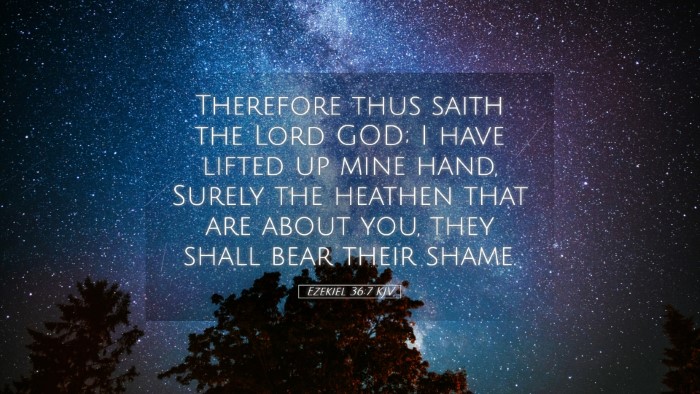Bible Commentary on Ezekiel 36:7
Ezekiel 36:7 (KJV): "Therefore thus saith the Lord God; I have lifted up mine hand, and I have sworn that the nations that are about you, they shall bear their shame."
Introduction
The verse found in Ezekiel 36:7 serves as a pivotal point in the prophetic literature of Ezekiel, showcasing God's sovereignty and the judgment upon the nations surrounding Israel. These nations had rejoiced in Israel's downfall and profaned God's name, but this passage marks a declaration of God's intention to act in a manner that vindicates His people and restores His glory.
Contextual Overview
The context of Ezekiel 36 revolves around the theme of restoration. After the profound judgment and exile that befell Israel and Judah due to their sinfulness, this chapter represents a shift from a tone of judgment to one of hope. The promise of renewal is intended to restore not only Israel's fortunes but also God's name among the nations.
Theological Insights
God's Sovereignty
Matthew Henry emphasizes that God's hand in history is sovereign and purposeful. In this verse, God's oath and lifted hand signify His divine authority and commitment to ensuring the shame of the nations that have scorned His people. This signifies ultimate accountability for those who have opposed God's chosen people.
The Role of the Nations
Albert Barnes comments on the significance of the nations surrounding Israel. They are not merely geographic entities; rather, they represent broader powers and forces that often stand against God’s plan. Their shame reflects not just a national failure but a theological rejection of God’s reign and justice. In their downfall, God demonstrates His ability to turn the tables on those who oppose His will, asserting that He alone is the sovereign ruler over all nations.
Divine Restoration
Adam Clarke suggests that this passage also serves as a precursor to the blessings and restoration that follow. God declares not only the judgment of the nations but also the future restoration of Israel, emphasizing that their current state does not represent their ultimate destiny. The restoration involves spiritual renewal, signaling the return of God's favor and presence among His people, thus elevating their identity in the world.
Literary Analysis
The structure of this verse draws attention to both God's declaration and the consequences for the nations. The use of “therefore” indicates a logical connection to previous verses that describe the rejection and scorn faced by Israel. It sets the stage for the divine response and serves as a reminder of the weight of God's promises.
Application for Theologians and Pastors
This verse challenges theological interpretations surrounding justice and shame. It highlights the reality that God is actively engaged in the moral order of the universe. For pastors and theologians addressing contemporary issues of injustice, this text serves as a powerful reminder that God sees the dynamics of power and oppression and will ultimately act to fulfil His justice.
Encouragement for Believers
Furthermore, this passage reassures believers that even amidst suffering and dislocation, there is hope for vindication and restoration. It teaches practitioners of the faith to trust in God's timing and sovereign authority, suggesting that while things may appear bleak, God's promise of renewal and elevation for His people is certain.
Conclusion
In conclusion, Ezekiel 36:7 serves as a profound reminder of God's sovereign authority over nations and His ultimate desire to restore His people, thereby revealing His character as a righteous judge and a redeemer. Believers and scholars alike are encouraged to anchor their faith in the assurance that no nation or power can thwart God's purpose, and that every action taken against His people is seen and will be addressed by the Almighty.


